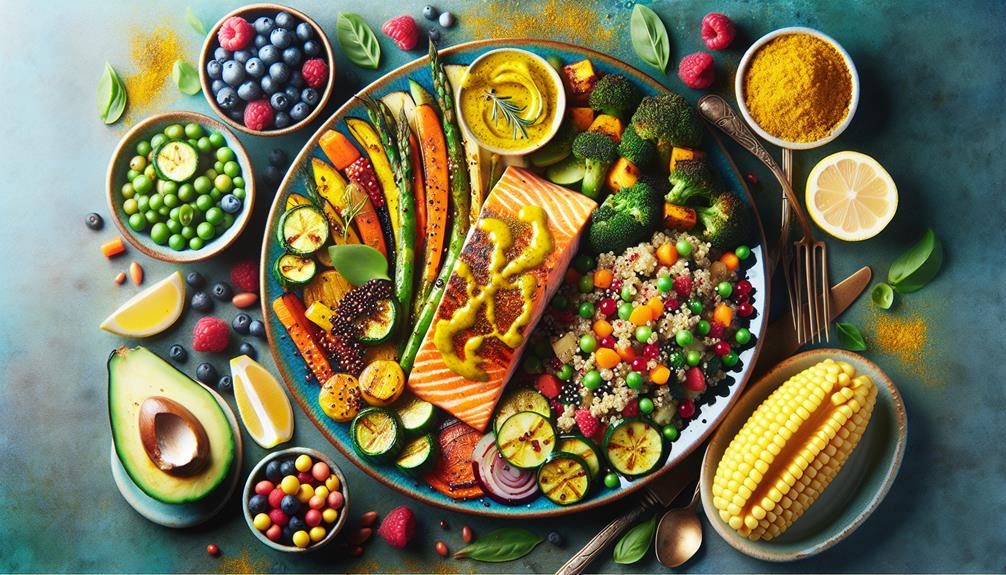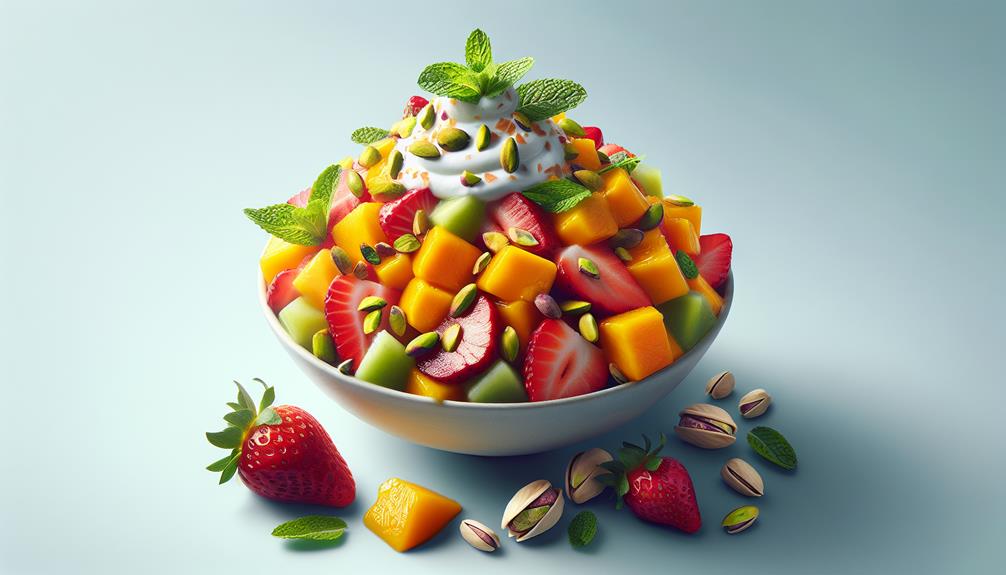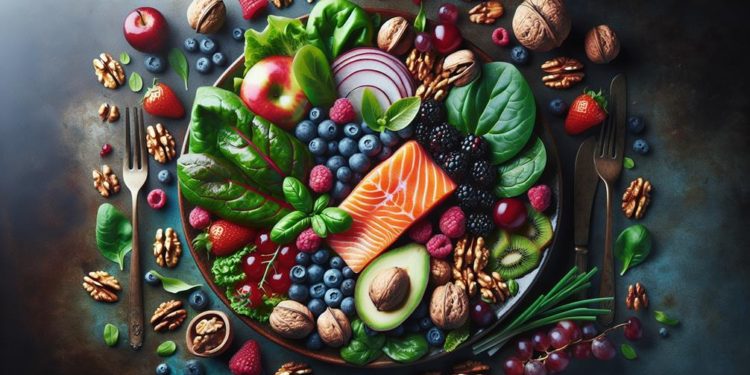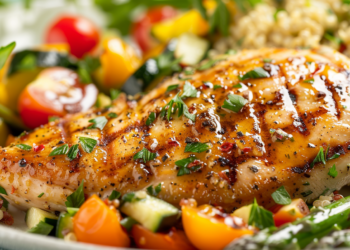Are you tired of feeling like a fire-breathing dragon, with inflammation causing havoc in your body? Well, fret not, because we have just the antidote you need. In this discussion, we will introduce you to a collection of delectable recipes specifically designed to combat inflammation. These culinary creations will not only tantalize your taste buds but also work their magic to soothe and calm the fires within. So, get ready to embark on a journey of flavor and wellness as we unveil a treasure trove of anti-inflammatory delights.
Key Takeaways
- Smoothies packed with fruits and vegetables, such as berries and spinach, provide vitamins, minerals, and antioxidants to reduce inflammation.
- Incorporating nutrient-dense options like egg and vegetable scrambles or grain-free pancakes made with almond or coconut flour can support an anti-inflammatory diet.
- Lunch options like quinoa salad with avocado and chickpeas or grilled chicken with roasted vegetables offer a combination of fiber, healthy fats, and antioxidant-rich ingredients to fight inflammation.
- Healthy snacks like trail mix with nuts and dried fruits, veggie sticks with hummus, and Greek yogurt with berries can help combat inflammation throughout the day.
Breakfast Recipes for an Anti-Inflammatory Diet
Start your day off right with delicious and nutritious breakfast recipes that are tailored to an anti-inflammatory diet. When it comes to an anti-inflammatory breakfast, smoothies are a great option. Packed with fruits and vegetables, they provide a burst of vitamins, minerals, and antioxidants that can help reduce inflammation in your body. Try blending together some spinach, berries, almond milk, and a scoop of protein powder for a satisfying and inflammation-fighting smoothie.
If you prefer a more solid breakfast option, there are plenty of grain-free choices that fit into an anti-inflammatory diet. For example, you can make a delicious egg and vegetable scramble. Just sauté some bell peppers, onions, and spinach in olive oil, then add beaten eggs and cook until scrambled. This hearty and nutrient-dense meal is not only delicious but also packed with anti-inflammatory ingredients.
Another great option is to make grain-free pancakes using almond flour or coconut flour. These flours are rich in healthy fats and have a lower glycemic index compared to traditional grain flours, making them a better choice for those following an anti-inflammatory diet. Serve them with fresh berries and a drizzle of pure maple syrup for a guilt-free breakfast.
Lunch Ideas to Fight Inflammation
For a lunch that fights inflammation, incorporate nutrient-rich ingredients that are known to have anti-inflammatory properties. By choosing the right combination of foods, you can create a lunch that not only satisfies your taste buds but also supports your overall health. Here are four lunch ideas that are packed with anti-inflammatory ingredients to help you combat inflammation and promote a healthy lifestyle:
- Quinoa Salad with Avocado and Chickpeas: Quinoa is a whole grain that is rich in fiber and contains antioxidants that fight inflammation. Avocado provides healthy fats, while chickpeas offer plant-based protein and fiber, both of which help to reduce inflammation.
- Salmon Wrap with Spinach and Hummus: Salmon is an excellent source of omega-3 fatty acids, which have been shown to reduce inflammation in the body. Pair it with fresh spinach, which is packed with vitamins and minerals, and hummus, a delicious and creamy spread made from chickpeas that also has anti-inflammatory properties.
- Lentil Soup with Turmeric: Lentils are high in fiber and protein, making them a great choice for a satisfying lunch. Adding turmeric, a spice known for its anti-inflammatory benefits, enhances the soup's flavor and provides additional health benefits.
- Grilled Chicken with Roasted Vegetables: Lean proteins like chicken can help reduce inflammation. Pair it with a variety of colorful roasted vegetables such as bell peppers, sweet potatoes, and Brussels sprouts, all of which contain antioxidants and anti-inflammatory compounds.
When planning your meals, consider these lunch recipes that are not only delicious but also support your body's fight against inflammation. Incorporating these nutrient-rich ingredients into your meal planning can help you maintain a healthy and balanced diet.
Dinner Recipes to Reduce Inflammation

To continue supporting your body's fight against inflammation, let's explore some dinner recipes that are packed with anti-inflammatory ingredients. Incorporating these main course recipes into your anti-inflammatory diet can not only provide you with a delicious meal but also help reduce inflammation in your body.
One dinner idea for reducing inflammation is a salmon dish. Salmon is rich in omega-3 fatty acids, which have been shown to reduce inflammation. Try grilling or baking a salmon fillet and serving it with a side of roasted vegetables or a green salad.
Another great option is a quinoa stir-fry. Quinoa is a whole grain that contains antioxidants and anti-inflammatory compounds. Cook up some quinoa and add in a variety of colorful vegetables like bell peppers, broccoli, and mushrooms. Season with herbs and spices like turmeric and ginger for an extra anti-inflammatory boost.
If you're in the mood for something heartier, consider a lentil soup. Lentils are high in fiber and protein, and studies have shown that they can help reduce inflammation markers in the body. Simmer lentils with vegetables, herbs, and spices to create a comforting and nourishing soup.
Healthy Snacks to Combat Inflammation
Incorporating nutritious snacks into your diet can be an effective way to combat inflammation and support your overall well-being. When it comes to healthy snacks that fight inflammation, there are plenty of options to choose from. Here are four quick and easy anti-inflammatory snack ideas, with a focus on plant-based options for reducing inflammation:
- Trail mix: Create your own trail mix using a variety of nuts, seeds, and dried fruits. Nuts like almonds and walnuts are rich in healthy fats and antioxidants, while seeds like flaxseeds and chia seeds provide omega-3 fatty acids. Dried fruits like cherries and blueberries are packed with antioxidants.
- Veggie sticks with hummus: Slice up some crunchy vegetables like carrots, celery, and bell peppers and pair them with a delicious homemade hummus. Chickpeas, the main ingredient in hummus, are a great source of fiber and plant-based protein.
- Avocado toast: Spread mashed avocado on whole grain toast for a satisfying and anti-inflammatory snack. Avocados are loaded with monounsaturated fats, which have been shown to reduce inflammation in the body.
- Greek yogurt with berries: Enjoy a bowl of Greek yogurt topped with your favorite berries. Greek yogurt is high in protein and probiotics, which can help reduce inflammation in the gut. Berries, such as strawberries and raspberries, are packed with antioxidants.
Desserts That Support an Anti-Inflammatory Lifestyle

When it comes to supporting an anti-inflammatory lifestyle, even desserts can play a role in promoting overall well-being. While traditional desserts are often loaded with sugar and unhealthy fats, there are indulgent yet healthy alternatives that can satisfy your sweet tooth without causing inflammation in the body. One option is to incorporate anti-inflammatory ingredients into your desserts, such as fruits, nuts, and spices.
One popular choice is the anti-inflammatory smoothie bowl. These bowls are not only delicious but also packed with nutrients that can fight inflammation. For example, you can blend together frozen berries, spinach, almond milk, and a scoop of turmeric or ginger for a refreshing and nourishing dessert.
Another option is to make healthier versions of classic desserts. For instance, you can make a gluten-free and refined sugar-free apple crumble using almond flour, coconut oil, and a touch of maple syrup. This dessert still provides the comforting flavors you love, but without the inflammatory ingredients.
Frequently Asked Questions
Can an Anti-Inflammatory Diet Help With Conditions Other Than Inflammation?
An anti-inflammatory diet can improve your overall well-being beyond just reducing inflammation. Research suggests that it may also benefit mental health by reducing symptoms of depression and anxiety.
Are There Any Specific Ingredients or Foods That Should Be Avoided in an Anti-Inflammatory Diet?
Avoid processed foods, sugary drinks, and excessive alcohol in an anti-inflammatory diet. These culprits can trigger inflammation and hinder your progress. Stick to whole, nutrient-rich foods to maximize the benefits of an anti-inflammatory diet and support weight loss.
Can the Recipes in This Article Be Easily Customized to Accommodate Different Dietary Restrictions or Preferences?
You can easily customize the recipes in this article to accommodate your dietary restrictions or preferences. There are plenty of customization options available to help you tailor the recipes to your specific needs.
Are There Any Recommended Portion Sizes or Serving Suggestions for the Recipes Provided?
To ensure proper portion sizes and meal planning, recommended portion sizes and serving suggestions are provided for the recipes. This helps you maintain a balanced and anti-inflammatory diet with ease.
Are There Any Tips or Suggestions for Meal Planning and Prepping to Incorporate These Recipes Into a Daily Anti-Inflammatory Diet?
When it comes to incorporating these anti-inflammatory recipes into your daily diet, meal prep tips can make it easier. Customize the recipes to fit your dietary restrictions and plan ahead for a successful week of healthy eating.
Conclusion
Incorporating anti-inflammatory foods into your diet can have a profound impact on your overall health. These recipes provide a delicious and satisfying way to combat inflammation, supporting a lifestyle that promotes wellness and vitality. Just as a gentle rain soothes the parched earth, these meals nourish and calm your body, reducing inflammation and promoting optimal well-being. Embrace the power of an anti-inflammatory diet and experience the transformative effects it can have on your health.













